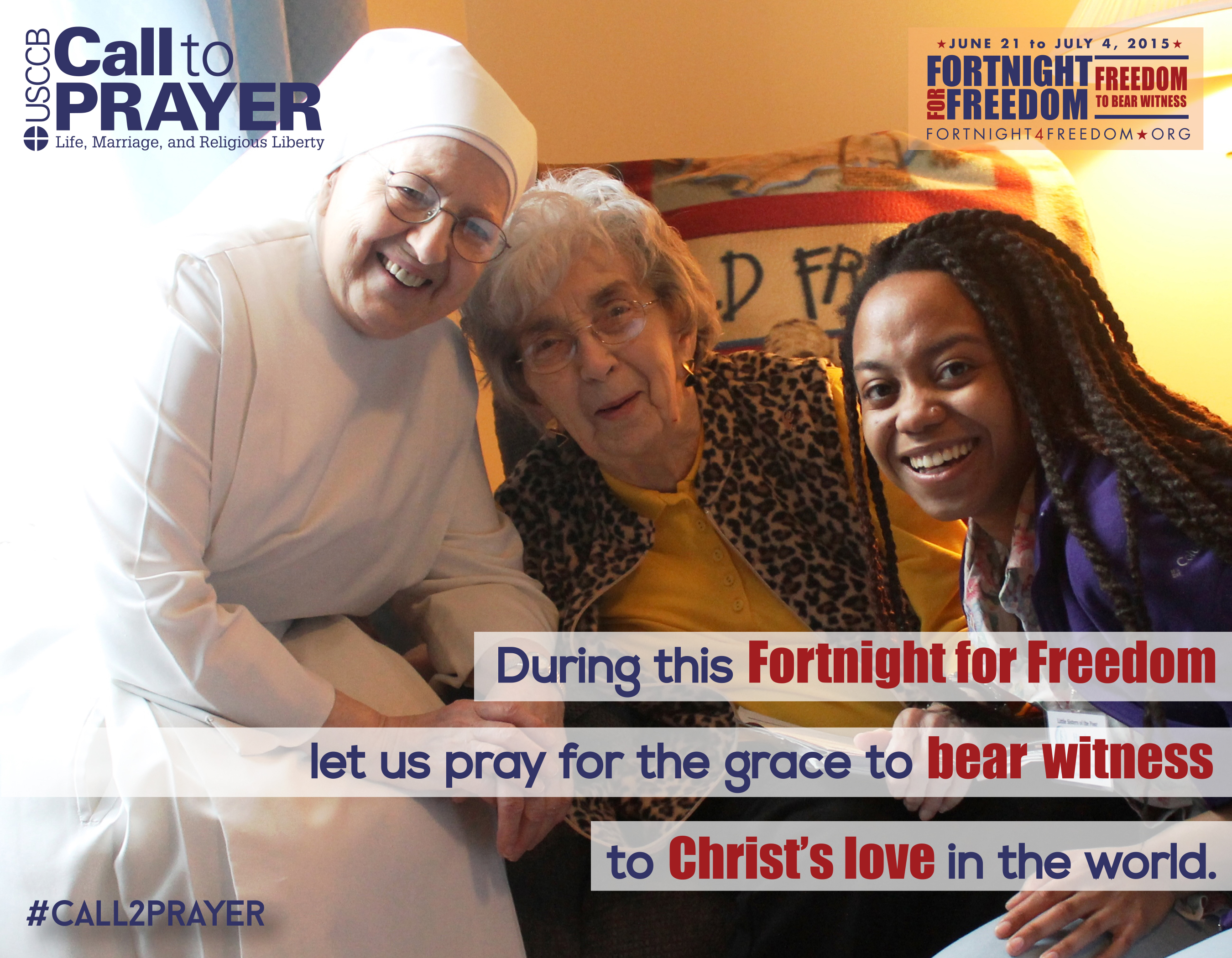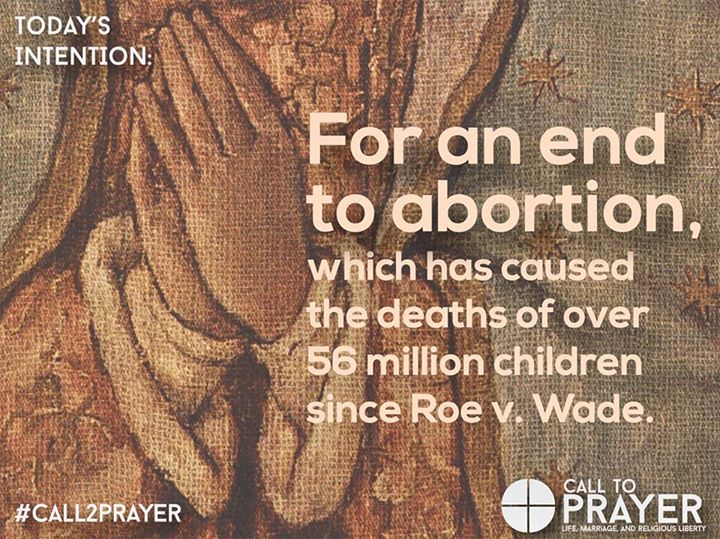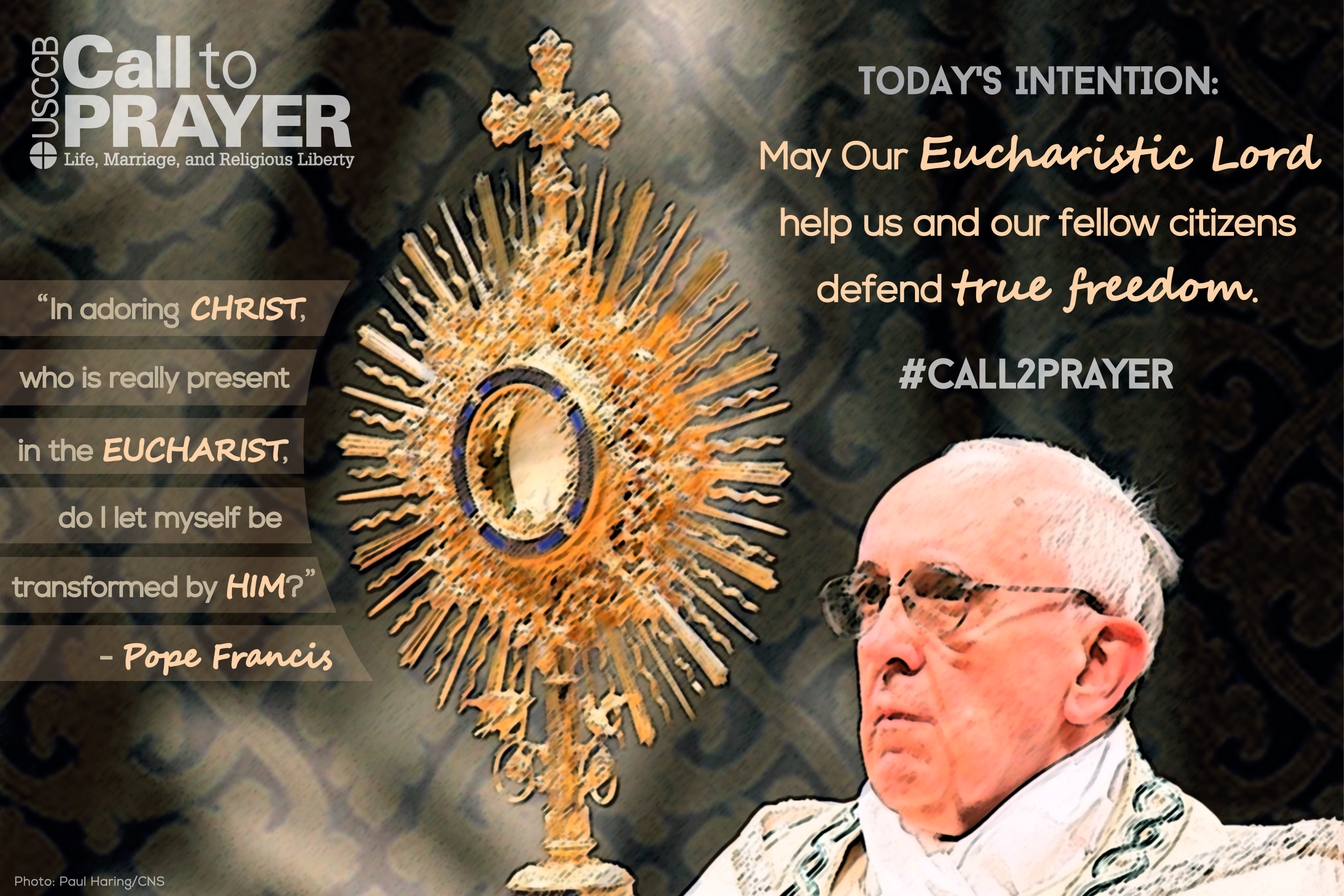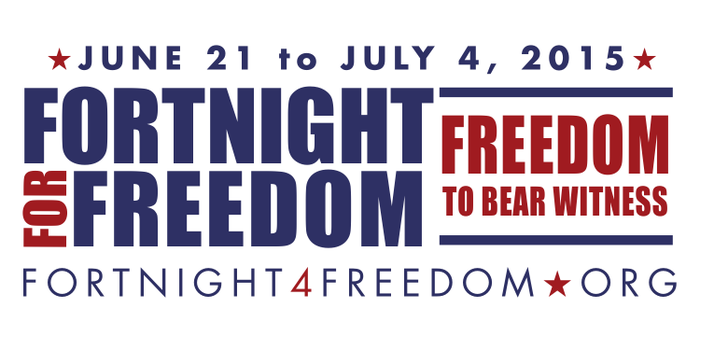USCCB Statement on Marriage Ruling
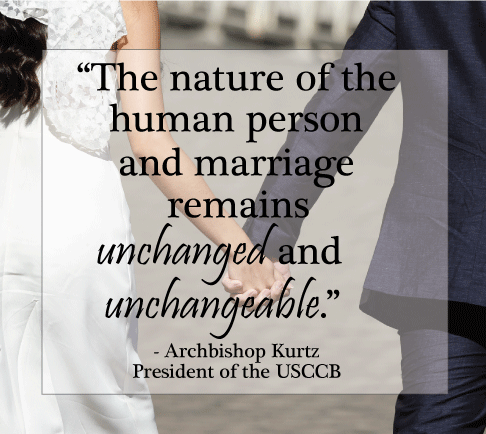 Today Archbishop Kurtz issued a statement about the Supreme Court’s marriage ruling, calling it a “tragic error that harms the common good and most vulnerable among us.” Read the full statement here.
Today Archbishop Kurtz issued a statement about the Supreme Court’s marriage ruling, calling it a “tragic error that harms the common good and most vulnerable among us.” Read the full statement here.
Archbishop Kurtz compared the decision to Roe v. Wade and how it doesn’t change the truth- which is “unchanged and unchangeable.” He continues on to say that, “Neither decision is rooted in the truth, and as a result, both will eventually fail. Today the Court is wrong again. It is profoundly immoral and unjust for the government to declare that two people of the same sex can constitute a marriage.”
It is a deep truth that the human being is an embodied soul, male and female. The archbishop writes, “The unique meaning of marriage as the union of one man and one woman is inscribed in our bodies as male and female” and notes that this is part of what Pope Francis has described as “integral ecology.” “The law has a duty to support every child’s basic right to be raised, where possible, by his or her married mother and father in a stable home.”
The bishops follow Jesus Christ who taught these truths unambiguously, and the president of the USCCB encouraged Catholics to keep speaking for the truth and moving forward with the theological virtues of faith, hope and love. Archbishop Kurtz ended by saying, “I ask all in positions of power and authority to respect the God-given freedom to seek, live by, and bear witness to the truth.”
In addition, a number of other statements have been made:
- Alaska Catholic Conference (Anchorage, Fairbanks, Juneau)
- Colorado Catholic Conference (Denver, Colorado Springs, Pueblo)
- Iowa Catholic Conference (Dubuque, Davenport, Des Moines, Sioux City)
- Kansas Catholic Conference (Kansas in Kansas City, Dodge City, Salina, Wichita)
- Louisiana Catholic Conference (Alexandria, Baton Rouge, Houma-Thibodaux, Lafayette, Lake Charles, New Orleans, Shreveport)
- Michigan Catholic Conference (Detroit, Lansing, Kalamazoo, Saginaw, Marquette, Gaylord, Grand Rapids)
- Nebraska Catholic Conference (Omaha, Lincoln, Grand Island)
- Ohio Catholic Conference (Cincinnati, Columbus, Cleveland, Steubenville, Toledo, Youngstown)
- Texas Catholic Conference (Galveston-Houston, San Antonio, Amarillo, Austin, Beaumont, Brownsville, Corpus Christi, Dallas, El Paso, Fort Worth, Laredo, Lubbock, San Angelo, Tyler, Victoria)
- Virginia Catholic Conference (Arlington, Richmond)
- Wisconsin Catholic Conference (Milwaukee, Green Bay, Madison, La Crosse, Superior)
- His Eminence Cardinal O’Malley, Archbishop of Boston
- His Eminence Cardinal DiNardo, Archbishop of Galveston-Houston
- His Eminence Cardinal Wuerl, Archbishop of Washington, ADW Statement
- Most Reverend Edward B. Scharfenberger, Bishop of Albany
- Most Reverend John O. Barres, Bishop of Allentown
- Most Reverend Wilton D. Gregory, Archbishop of Atlanta
- Most Reverend Joe S. Vásquez, Bishop of Austin
- Most Reverend William E. Lori, Archbishop of Baltimore, and a radio interview
- Most Reverend Robert J. Baker, Bishop of Birmingham
- Most Reverend David Kagan, Bishop of Bismarck
- Most Reverend Frank J. Caggiano, Bishop of Bridgeport
- Most Reverend Daniel Flores, Bishop of Brownsville
- Most Reverend Nicholas DiMarzio, Bishop of Brooklyn
- Most Reverend Richard J. Malone, Bishop of Buffalo and Chairman of the Committee for Laity, Marriage, Family Life and Youth. Also a column on this issue and religious freedom in the diocesan paper.
- Most Reverend Christopher J. Coyne, Bishop of Burlington
- Most Reverend Robert E. Guglielmone, Bishop of Charleston
- Most Reverend Peter Jugis, Bishop of Charlotte
- Most Reverend Paul D. Etienne, Bishop of Cheyenne
- Most Reverend Blase J. Cupich, Archbishop of Chicago
- Most Reverend Dennis M. Schnurr, Archbishop of Cincinnati
- Most Reverend Richard Lennon, Bishop of Cleveland
- Most Reverend Michael Mulvey, Bishop of Corpus Christi
- Most Reverend Michael J. Hoeppner, Bishop of Crookston
- Most Reverend Kevin Farrell, Bishop of Dallas
- Most Reverend Allen H. Vigneron, Archbishop of Detroit
- Most Reverend Mark Seitz, Bishop of El Paso
- Most Reverend Lawrence Persico, Bishop of Erie
- Most Reverend Chad Zielinski, Bishop of Fairbanks
- Most Reverend John Thomas Foldas, Bishop of Fargo
- Most Reverend Kevin Rhoades, Bishop of Fort Wayne- South Bend
- Most Reverend Armando X. Ochoa, Bishop of Fresno (video link)
- Most Reverend James S. Wall, Bishop of Gallup
- Most Reverend Donald J. Hying, Bishop of Gary
- Most Reverend Steven J. Raica, Bishop of Gaylord
- Most Reverend Walkowiak, Bishop of Grand Rapids
- Most Reverend David L. Ricken, Bishop of Green Bay
- Most Reverend Leonard P. Blair, Archbishop of Hartford
- Most Reverend Larry Silva, Bishop of Honolulu
- Most Reverend Joseph William Tobin, CSsR, Archbishop of Indianapolis
- Most Reverend Joseph Kopacz, Bishop of Jackson
- Most Reverend John R. Gaydos, Bishop of Jefferson City
- Most Reverend R. Daniel Conlon, Diocese of Joliet
- Most Reverend Paul J. Bradley, Bishop of Kalamazoo
- Most Reverend Richard F. Stika, Bishop of Knoxville
- Most Reverend Michael Jarrell, Bishop of Lafayette
- Most Reverend Timothy L. Doherty, Bishop of Lafayette in Indiana
- Most Reverend Glen J. Provost, Bishop of Lake Charles
- Most Reverend James A. Tamayo, Bishop of Laredo
- Most Reverend Joseph A. Pepe, Bishop of Las Vegas
- Most Reverend John Stowe, OFM Conv., Bishop of Lexington
- Most Reverend James D. Conley, Bishop of Lincoln
- Most Reverend Anthony B. Taylor, Bishop of Little Rock
- Most Reverend Jose H. Gomez, Archbishop of Los Angeles, also his article “Creation and the Future of Marriage”
- Most Reverend Robert C. Morlino, Bishop of Madison
- Most Reverend J. Terry Steib, SVD, Bishop of Memphis
- Most Reverend Thomas Wenski, Archbishop of Miami
- Most Reverend Jerome E. Listecki, Archbishop of Milwaukee and his blog post “Church, State, and Catholicism”
- Most Reverend David R. Choby, Bishop of Nashville
- Most Reverend Gregory Aymond, Archbishop of New Orleans
- Most Reverend Terry LaValley, Diocese of Ogdensburg
- Most Reverend Paul S. Coakley, Archbishop of Oklahoma
- Most Reverend John Noonan, Bishop of Orlando
- Most Reverend William F. Medley, Bishop of Owensboro, Kentucky
- Most Reverend Gerald M. Barbarito, Bishop of Palm Beach
- Most Reverend Arthur J. Serratelli, Bishop of Paterson
- Most Reverend Charles J. Chaput, Archbishop of Philadelphia, also his July 6 column and a special edition column in which he shares “The Importance of Thinking Clearly” by Rev. Dominic Legge, O.P.
- Most Reverend David A. Zubik, Bishop of Pittsburgh
- Most Reverend Alexander Sample, Bishop of Portland
- Most Reverend Robert Deeley, Bishop of Portland, Maine
- Most Reverend Thomas J. Tobin, Bishop of Providence, also encouraging conscientious objection
- Most Reverend Michael Burbidge, Bishop of Raleigh
- Most Reverend David J. Malloy, Bishop of Rockford
- Most Reverend William Murphy, Bishop of Rockville Centre
- Most Reverend Jaime Soto, Bishop of Sacramento
- Most Reverend Robert J. Carlson, Archbishop of Saint Louis
- Most Reverend Donald J. Kettler, Bishop of Saint Cloud
- Most Reverend Edward Joseph Weisenburger, Bishop of Salina
- Most Reverend Michael J. Sis, Bishop Of San Angelo
- Most Reverend Gustavo García‐Siller, Archbishop of San Antonio; also interviewed for a news story.
- Most Reverend Gerald R. Barnes, Bishop of San Bernardino
- Most Reverend Robert W. McElroy, Bishop of San Diego
- Most Reverend Patrick J. McGrath, Bishop of San Jose
- Most Reverend John C. Wester, Archbishop of Santa Fe
- Most Reverend Gregory J. Hartmayer, Bishop of Savannah
- Most Reverend Joseph C. Bambera, Bishop of Scranton
- Most Reverend Paul J. Swain, Diocese of Sioux Falls
- Most Reverend Thomas John Paprocki, Bishop of Springfield in Illinois
- Most Reverend James V. Johnston, Jr, Bishop of Springfield-Cape Girardeau
- Most Reverend Felipe J. Estévez, Diocese of St. Augustine
- Most Reverend Robert J. Cunningham, Bishop of Syracuse
- Most Reverend Daniel E. Thomas, Bishop of Toledo
- Most Reverend David M. O’Connell, C.M., Bishop of Trenton
- Most Reverend Gerald Kicanas, Bishop of Tucson
- Most Reverend Edward J. Slattery, Bishop of Tulsa
- Most Reverend J. Strickland, Bishop of Tyler
- Most Reverend Michael J. Bransfield, Bishop of Wheeling-Charleston
- Most Reverend Carl A. Kemme, Bishop of Wichita
- Most Reverend Robert J. McManus, Bishop of Worcester
- Most Reverend George V. Murry, Bishop of Youngstown
- Diocese of Cheyenne
- Diocese of Harrisburg
- Diocese of Salt Lake City
- Diocese of Venice
Also of note are statements from our Ecumenical partners:
The Anglican Church of North America
Russell Moore, President of the Ethics and Religious Liberty Commission
Archive
Call to Prayer: June 26, 2015
Archive
Archbishop Listecki on Radical Individuality
Archbishop Listecki of the Archdioces of Milwaukee wrote a piece on his blog about the recent headlines regarding Bruce Jenner and Rachel Dolezal.
The archbishop reminds us that, “[F]reedom is never exercised in a vacuum. Freedom demands responsibility and that is a responsibility to truth, beauty and goodness…” and “we have characterized “truth” as whatever we want to make of it. Therefore, truth is only accountable to the individual.”
Finally, Archbishop Listecki says, “We have lost the sense of sacred and in so doing, everything becomes profane and is subjected to our own individual appreciation.”
Archive
A Home for the Wounded Heart: Chapter 8 WMOF Catechesis
World Meeting of Families Catechesis Series
The USCCB is excited about the World Meeting of Families (WMOF) being held in Philadelphia in September 2015. We are presenting a series of short articles focused on the WMOF Catechesis Love is our Mission: The Family Fully Alive and its implications for our daily lives. We will follow the timing suggested by the Archdiocese of Philadelphia by exploring one theme each month leading up to the World Meeting.
Chapter Eight: A Home for the Wounded Heart
Paul Jarzembowski
Secretariat of Laity, Marriage, Family Life and Youth
While working as a young adult minister at a parish several years ago, I had the opportunity to meet a married couple in their late 20’s at our summer Theology-on-Tap series. They wandered into the event, uncertain of what to expect, and, because they did not know any other young adults there, quietly slid into a booth near the back of the restaurant. Noticing their uneasiness, I discreetly sat next to them so that they would have someone to talk to. After some pleasantries and basic introductions, I asked them what brought them there … and eventually I found out that they were struggling with a number of issues: economic uncertainty, living from one paycheck to the next, but also infertility and frustrating relationships with their parents and extended families.
I have no recollection of who spoke at Theology-on-Tap that evening or the topic discussed, but I do remember that couple. Hearing their story, listening to their concerns, and inviting them to stay in touch in the weeks, months, and years afterwards was the important part of the night for me. It is a blessing to my ministry that I still hear from this couple to this day.
It was this incident that came to mind while I read chapter eight of Love Is Our Mission: “A Home for the Wounded Heart.” It reads, “To grasp the Church’s ministry of teaching correctly, we also need to consider her pastoral nature,” reminding us of Pope Francis’ beautiful image of Church as “a field hospital after battle” (no. 151). The young couple I met had been going through a hard battle against economics, infertility, and family strife – and they sought refuge at their local young adult gathering.
Their story is not unlike other young couples’ stories—or indeed, singles as well. From debt, careers, and economic crises to abuse (verbal, physical, psychological) and neglect, as well as feelings of inadequacy, depression, and difficulty balancing time, many young people(single, dating, engaged, and married alike) are struggling – often hiding their angst in public. Yet in the midst of their woundedness, they are seeking Christ.
The couple I met that summer night was wounded. They came to Theology-on-Tap to get away from their problems for an evening, but had no one approached them, those same struggles would have been unchanged the next morning. When they walked in, I was tempted to talk their heads off with all the great opportunities waiting for them at the church – but something told me to shut up and listen. And that made all the difference in the world.
Every couple, whether they are dating, engaged, or married for many years, has a story – and all are wounded in some way, even beaten down by a variety of frustrations. To be a home for the wounded, sometimes it is best to simply listen, to offer them refuge from the pain and angst, and to share the presence of Christ Jesus, who says to them and to all of us in our struggles: “Come to me … and I will give you rest.”
Archive
First Amendment Defense Act
Representative Labrador (R- Idaho) and Senator Lee (R-Utah) introduced the First Amendment Defense Act last week.
Archbishops Cordileone and Lori sent them each a letter of support, and the USCCB put out a media release.
Quoting from the letters: “FADA would provide significant protection for religious liberty at the federal level and would be an important measure in extending conscience protection to individuals and organizations who believe marriage is the union of one man and one woman. As a non-discrimination Act, FADA would protect these individuals and organizations from federal government discrimination. In a climate of increasing intolerance, these protections are very much needed.”
Archive
Call to Prayer: June 19, 2015
Archive
Evangelii Gaudium: Mary, Mother of Evangelization
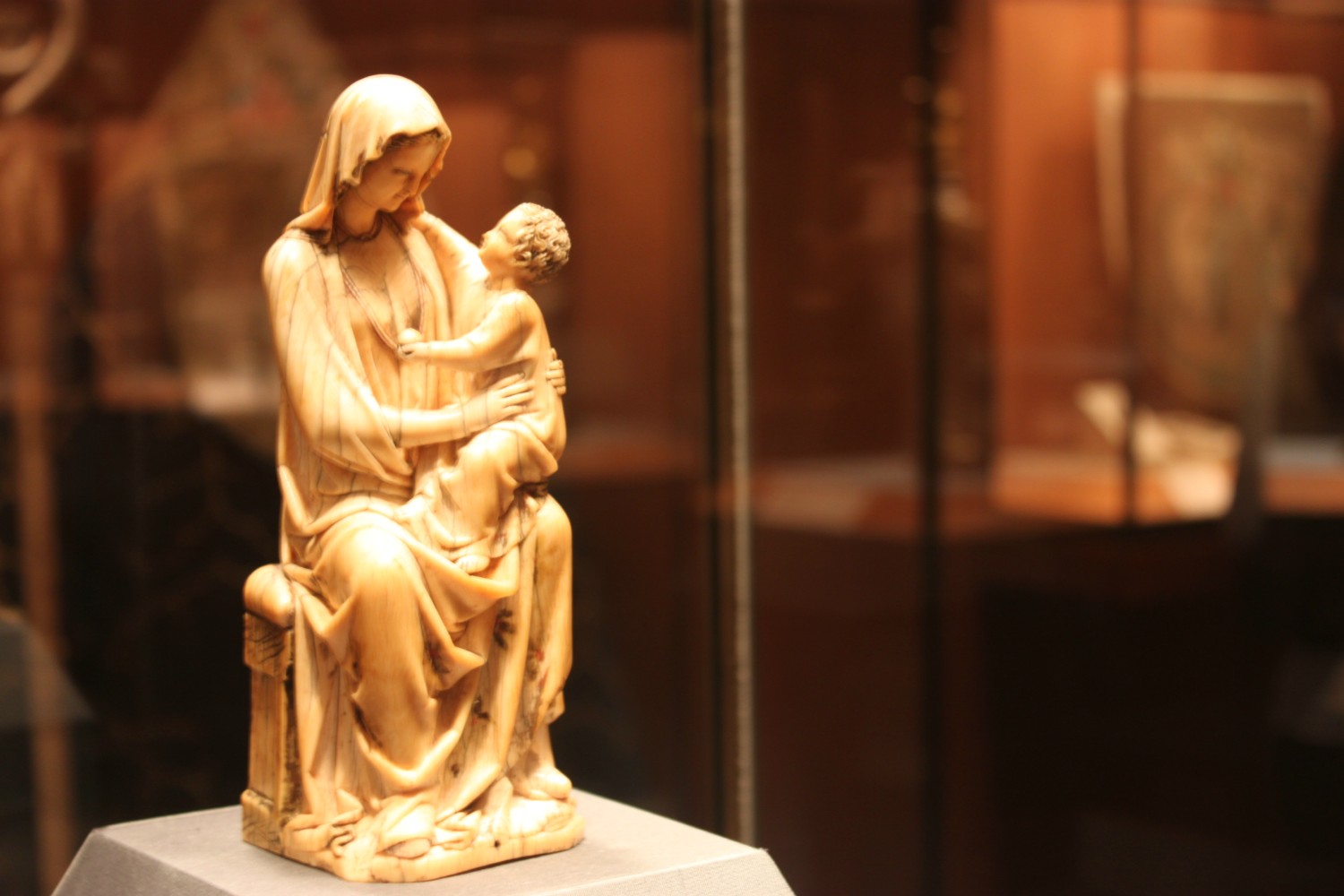 Lessons from Evangelii Gaudium #20
Lessons from Evangelii Gaudium #20
Pope Francis’s Apostolic Exhortation on the proclamation of the Gospel in today’s world, Evangelii Gaudium or “The Joy of the Gospel,” has many points that are relevant to the work of Marriage: Unique for a Reason. This series will explore some of these themes and apply Pope Francis’s words to the culture of marriage and family in the United States.
Mary, Mother of Evangelization
Pope Francis ends his apostolic exhortation by turning to Mary, who is our model and our help in evangelization. If we reflect on Christ’s dying words in the Gospel of John, “Here is your mother” (Jn 19:27), we see that in this most important moment, in “the supreme hour of the new creation,” Christ turns our attention to Mary (no.285). He offers us his mother to be our own, as “an icon of womanhood” to intimately accompany the Church, which includes each one of us (no. 285).
The Holy Father reminds us of the myriad roles that Mary plays in the life of the Church. She is the “handmaid of the Father who sings his praises…the friend who is ever concerned that wine not be lacking gin our lives…the woman whose heart was pierced by a sword…a sign of hope…the missionary who draws near to us…a true mother” (no. 286). In these many ways and more, Mary is with each of us, sharing our history, struggles, and our mission. What a wonderful gift Christ has given us! Her maternal comfort is a wellspring of strength and hope for all who are weary and suffering.
As the one who allowed herself to be completely open to and guided by the Holy Spirit, Mary is our model of perfect faith; she is “the Mother of the Church which evangelizes” (284). She accompanies us as we enter more deeply into the mystery of faith—a journey often riddled with moments of “aridity, darkness, and even fatigue” (no. 287). She herself, Pope Francis tells us, often experienced these things, as she “lived in intimacy with the mystery of her Son, and went forward in her pilgrimage of faith” (no. 287). As we strive to live in that same intimacy, she offers us the comfort of her maternal presence especially through the moments of darkness and uncertainty.
In gratitude for the gift of His mother that Christ gave us, we must keep love and reverence for Mary alive in our homes, without whom “we could never truly understand the spirit of the new evangelization” (no. 284). We must look to her for the form that evangelization should take, especially within our family lives. She has shown us that justice and tenderness, contemplation and work, must always be held together. When we live in this way, looking to our Mother for guidance, our homes with the entire Church can help to open the way “to the birth of a new world” (288).
Archive
Archbishop Coakley on the Future of Marriage
 An article from Archbishop Coakley of Oklahoma City.
An article from Archbishop Coakley of Oklahoma City.
Archive
A Home for the Wounded Heart: World Meeting of Families Catechesis Chapter 8
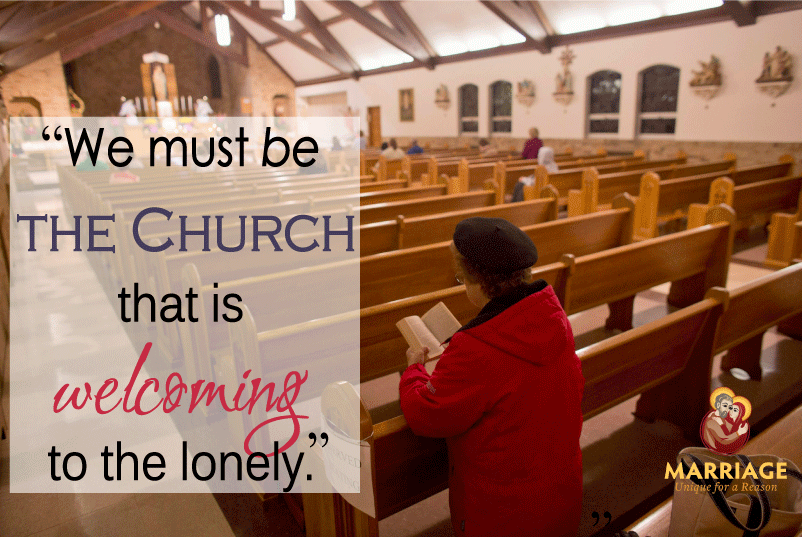 World Meeting of Families Catechesis Series
World Meeting of Families Catechesis Series
The USCCB is excited about the World Meeting of Families (WMOF) being held in Philadelphia in September 2015. We are presenting a series of short articles focused on the WMOF Catechesis Love is our Mission: The Family Fully Alive and its implications for our daily lives. We will follow the timing suggested by the Archdiocese of Philadelphia by exploring one theme each month leading up to the World Meeting.
Chapter Eight: A Home for the Wounded Heart
Sara Perla
Secretariat of Laity, Marriage, Family Life and Youth
The eighth chapter of the catechesis for the WMOF focuses on the Church as a home for the wounded. How many times have you heard someone say, “The Church should do something about that!” or, “And what did the Church do to help her?” What I find interesting about this kind of phrasing is that often the person who asks the question is a Christian. He or she is part of the Church, and thus directly implicated by the question. “The Church should do something about that,” should really spark: “I should do something about that.”
Loneliness, for example, is a well-documented problem in American society (check out Robert Putnam’s book Bowling Alone), and the Church should “do something” about it. But that doesn’t mean (only) that the bishops should “do something”, or even that the priests should “do something”. It is the lay people who must be actively involved if loneliness is to be combatted.
As the WMOF catechesis notes, Catholic teaching regarding same-sex attraction is sometimes perceived as cruel, “dooming men and women to a life of loneliness” (no. 166). Some think that because of this attraction the Church ostracizes those who experience it. This is not true, and it should not be true in practice. “If our parishes really were places where ‘single’ did not mean ‘lonely,’ where extended networks of friends and families really did share one another’s joys and sorrows, then perhaps at least some of the world’s objections to Catholic teaching might be disarmed” (no. 167).
I think this is right on target. The reasons that people give for allowing same-sex persons to be “married” are often those born from compassion. We all know the pain of loneliness and we would never want someone to suffer it in a particularly harsh way, for an extended amount of time, or somehow unnecessarily. Thus, in a culture where “having an erotic partner is perceived to be a necessity” (no. 166), it would follow that every person must be allowed to have a sexual partner to assuage loneliness.
But sex is not the antidote to loneliness—love and friendship are. Life without a sexual partner is not by that one fact, lonely. This should be somehow clear in parish life. I used to be self-conscious sitting alone at Sunday Mass as families filed in and around me. Then I made a concerted effort to notice how many other people were sitting alone, and how many families had a single parent, and discovered that there were many. People of many different ages and, presumably, situations, are sitting alone in the pews of our churches. Does the Church see them? And by that I mean: will anyone sitting next to them recognize them, say hello, or learn their names? Well … I can.
I am a single woman, and I live in a house with four others. I know a few single moms. My next door neighbor is a widow with three children. If we all just wait around for someone else to welcome us at a parish, we may be waiting forever. Instead, we must be the Church who is welcoming to the lonely. If someone needs to show the world that friendship is real and can be found in the Church, that someone is me—and you.
Archive
Call to Prayer: June 12
Archive
Australian Bishops Speak Out: Don’t Mess with Marriage
The Catholic bishops of Australia are rallying against the increasing acceptance of same-sex “marriage” and the pressure to adopt it. Their Pastoral Letter is named “Don’t Mess with Marriage”.
Archbishop Anthony Fisher, OP wrote about it to his people. Bishop Gregory O’Kelly, SJ of Port Pirie added his own letter to the mix, saying it simply and clearly:
“A pear is not an apple. Same-sex marriage is not the same as a marriage between a man and a woman. The opinions of media personalities, or politicians, or a parliamentary vote can do what they wish, but no matter how much they say it, a pear remains a pear and does not change into an apple. Equally same-sex marriage is not identical with a marriage between a man and a woman. In the Christian tradition marriage has the two aspects of the mutual support and love of a man and a woman, and the openness to procreation, to bearing life. That is what the word “parent” means in its Latin origin, a bearer, a creator, a life-giver. No matter how you use the word “marriage”, a same-sex union does not have the fundamental possibility of parenting. True marriage remains a vowed union between a man and a woman, a commitment for life, to provide a context in which new life might be born. The nature of marriage cannot be altered by the vote of politicians; it is not their area, it is the plan of God for the natural order.”
Archive
Call to Prayer: June 5
Archive
Fortnight for Freedom is Coming Up!
Let’s get ready to focus on religious freedom with the fortnight for freedom at the end of this month! View the video prepared for this year’s event.
Archive
Evangelii Gaudium: Intercessory Prayer
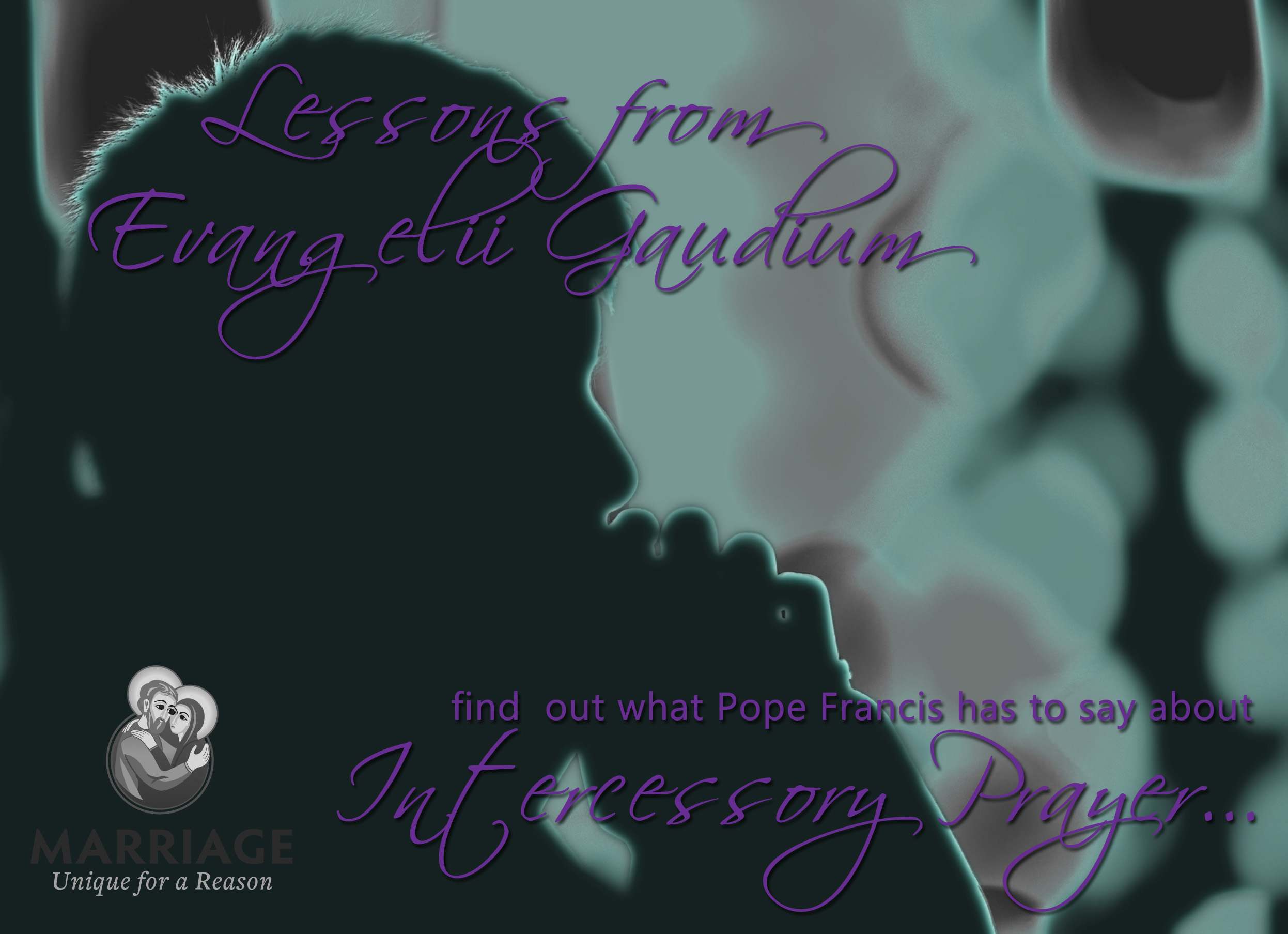 Lessons from Evangelii Gaudium #19
Lessons from Evangelii Gaudium #19
Pope Francis’s Apostolic Exhortation on the proclamation of the Gospel in today’s world, Evangelii Gaudium or “The Joy of the Gospel,” has many points that are relevant to the work of Marriage: Unique for a Reason. This series will explore some of these themes and apply Pope Francis’s words to the culture of marriage and family in the United States.
Intercessory Prayer (281-283)
While there are many ways to live out our prayer lives, Pope Francis calls our attention to one particular form of prayer: Intercession. The Catechism of the Catholic Church defines Intercessory prayer as “a prayer of petition which leads us to pray as Jesus did.” Though he is the “one intercessor with the Father on behalf of all men,” we can be united with him in this form of prayer (CCC, 2634).
For a concrete example of intercessory prayer, the Holy Father points us to St. Paul, who shows us that prayer is “full of people” in its concerns (no. 281). Paul tells the Philippians, “I constantly pray with you in every one of my prayers for all of you…because I hold you in my heart” (Phil 1:4, 7). Authentic intercessory prayer is marked by an attitude of attentiveness and gratitude that recognizes God’s work in the lives of others (no. 282). While intercession can often be misunderstood as “suspicious, negative and despairing,” Pope Francis teaches instead that, “when evangelizers rise from prayer, their hearts are more open; freed from self-absorption,…desirous of doing good and sharing their lives with others” (no. 282).
Because Jesus Christ is the true intercessor, our union with Him in prayer is a special way to gain access to the heart of the Father. And yet our prayer must always be offered in humility. When we intercede for others, “God’s heart is touched”—our prayer has true power—and “yet in reality he is always there first” (no.283). Intercessory prayer is not about what we want or what others want; instead it brings to light the love and work of God that is always already present there.
Our homes should be a fruitful place where this prayerful openness, gratitude, and concern for others abides. As a family, foster awareness of the needs of those around you—at work, at school, in the neighborhood, and around the world. Come together to pray for them, holding them in your heart, as St. Paul did. Then be sure to discuss the ways in which you notice God working. This is a wonderful way to unite as a family to Christ, to turn towards others, and to become ever more aware of God’s constant, loving presence.
